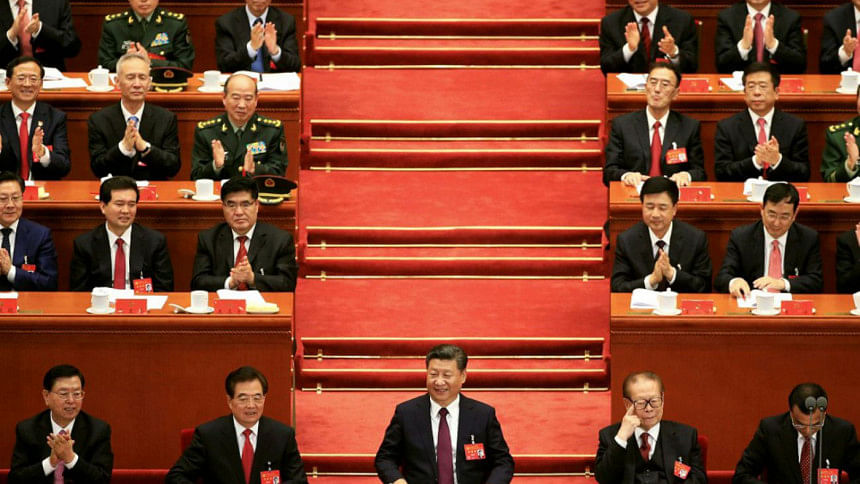No change in policies

It was leadership selection (not election) time for the Communist Party of China (CPC) and the government of the country. From October 18-24, 2,336 delegates representing nearly 90 million party cadres from across the nation gathered in a well-disciplined manner at the Great Hall of the People in Beijing for the 19th National Congress of CPC. Evidently, the impresario of the conclave was CPC General Secretary Xi Jinping.
China being the most populous nation and the second largest economy in the world, its monolithic political structure and policies of its leaders naturally draw great attention and focus from all across the globe. To many, the CPC Congress is an enigma, while others have projected distorted pictures of China's political system. Some have described the leadership reshuffle as a Game of Thrones plot.
The Congress had two broad objectives—first, to select the new party leadership, and second, to lay out the political agenda, the economic, foreign and military policies for the next five years.
When a single political party runs a country, intrigues, elbowing, purges and patronisation become an essential part of the struggle to get to the top of the power hierarchy. Selecting members for the main bodies of the CPC is not an open democratic procedure. The members for the three bodies—Central Committee, Politburo, and Politburo Standing Committee—are normally chosen behind closed doors long before the Congress. Since coming to power in 2012, Xi Jinping moved fast to consolidate his grip on power, through massive anti-corruption campaigns to neutralise rivals and securing total loyalty by creating new networks and liquidating the existing patronages.
The new Politburo Standing Committee, the highest decision maker of the party and the country, continues with Xi Jinping as General Secretary (64) and Premier Li Keqiang (62) and five new Xi loyalists.
Xi's "Chinese Dream" narrative has three broad aspects—economy, military, and foreign affairs. Chinese economy continues to grow at an impressive rate of 6.5 percent and now contributes 15 percent of global GDP. The reason why growth has slowed down from the double digits of a decade ago is because of the rising external debt which is now USD 1.56 trillion. To address the supply side over production, Xi wants to maintain stable growth by balancing the situation through encouraging more domestic consumption. Xi has encouraged technology companies to drive China's economic growth. China today is proud of its high-speed rail, commercial airlines, space technology, etc.
One of the inconsistencies of the Chinese economy is its non-convertible renminbi (yuan). Though China continues to attract huge FDI, it is yet to make the yuan fully convertible on its capital account. China's foreign exchange reserve currently stands at USD 4 trillion and the People's Bank of China can easily make the yuan fully convertible. The reason for holding back on this is because China wants to make the yuan internationally acceptable first and then make it convertible. Xi called for more open, inclusive and balanced economic order. But to make the Belt and Road Initiative successful, a convertible yuan is necessary. Xi also wants a bigger say in international financial organisations.
On foreign affairs, Xi said, "China would uphold rather than overturn the existing international order, but under this system, China demands a status that befits it power and strength." Xi said China had entered a new era of foreign policy, engaging in "major country diplomacy with Chinese characteristics." Clearly, China's economic might and military strength are influencing its foreign policy.
Will China's assertiveness in foreign affairs lead to Thucydides Trap with America? So far, Beijing has shown maturity in dealing with Washington despite provocative rhetoric from American leaders over South China Sea. China's geostrategic position has also discouraged America not to try a military solution over North Korea. However, Xi has made it clear that China will never give up on its legitimate national interest. Interestingly, Donald Trump's visit to China in November 2017 comes at a time when America has withdrawn from the Paris Climate Deal with Xi Jinping strongly supporting it. Relations between the two powers will remain troublesome but unlikely to degenerate into a military conflict.
People's Liberation Army, the world's biggest military force, is an essential pillar of the CPC. Xi wants to make it the best in the world by modernising its weapons systems. He has restructured the military command and got rid of corrupt generals. Xi stated that China would never pursue military expansion. As Chairman of the all-powerful Central Military Commission, Xi is now the Commander-in-Chief of PLA.
Xi's Chinese Dream is the third phase of what Mao Zedong has begun in 1949. In the first phase, Mao Zedong made the Chinese nation to stand up. In the second phase, Deng Xiaoping in 1978 paved the way for China to become a wealthy nation. In the third phase, Xi Jinping wants China to become strong by the middle of this century. Xi has set two centenary goals: to build China into a prosperous society by 2021, when the Communist Party marks its centennial; and to make China strong by 2049 when it celebrates its centennial.
The Congress concluded on October 24 with an amendment to CPC Charter inserting Xi Jinping's dream under "Xi Jinping Thought on Socialism with Chinese Characteristics for the New Era." He now is considered a "core" leader that has elevated him to the ranks of Mao Zedong and Deng Xiaoping.
Interestingly, the Congress ended without designating Xi Jinping's successor, which is normally the practice followed by party Congress. Will Xi Jinping get a third term? Maybe.
For the next five years at least, the world has to watch and deal with Xi Jinping, who holds absolute powers holding the posts of General Secretary of Politburo, Chairman of the CMC, and President of PRC.
Despite all the hullaballoo, however, the 19th session of CPC Congress has ended without any dramatic change in policies.
Mahmood Hasan is a former ambassador and secretary of the Bangladesh government.





Comments